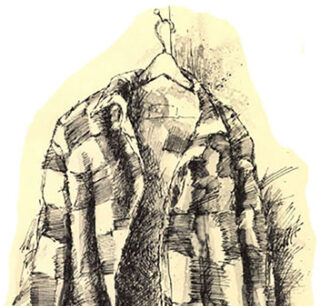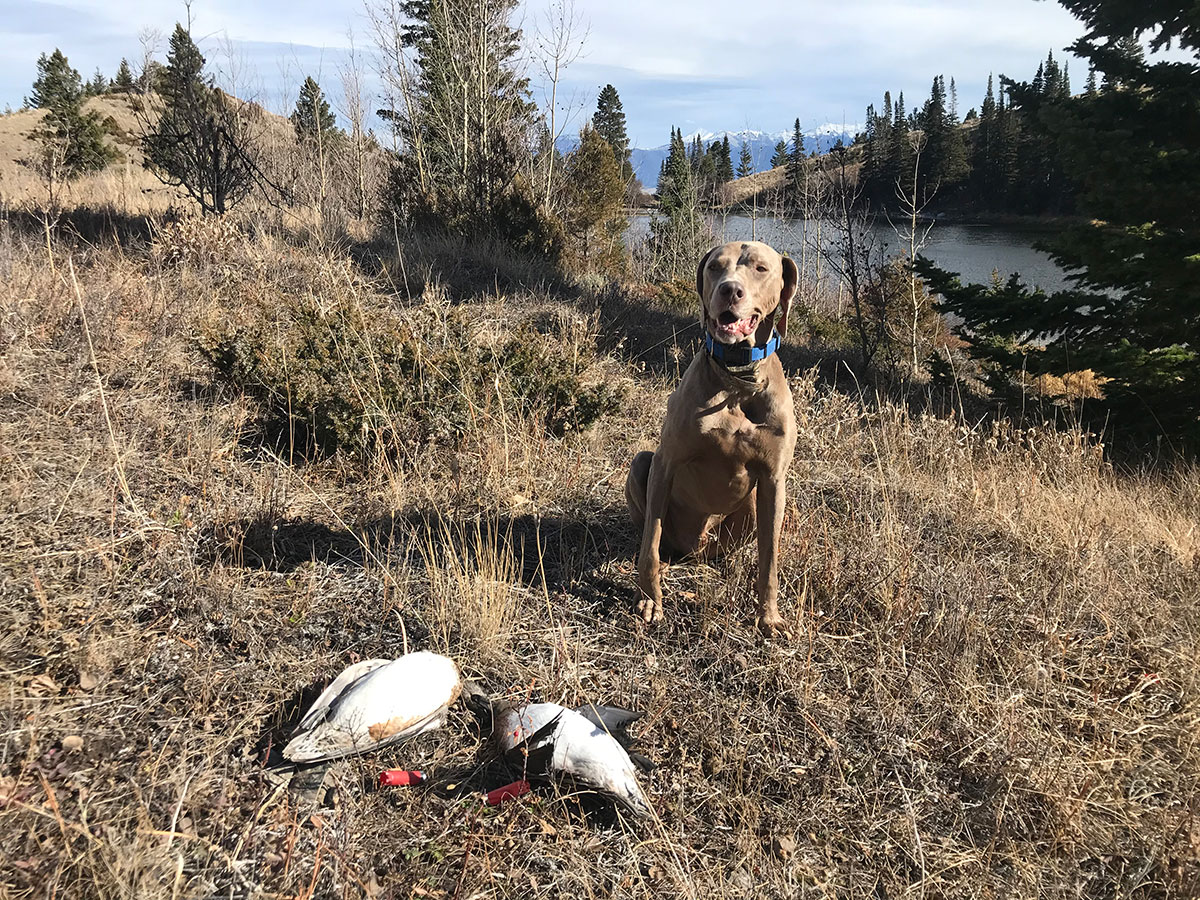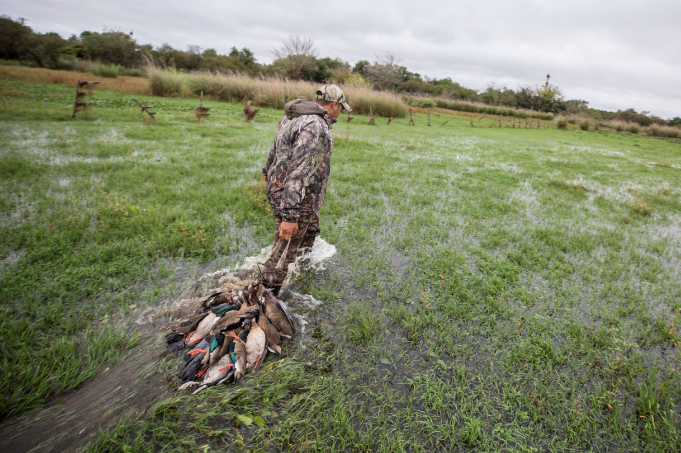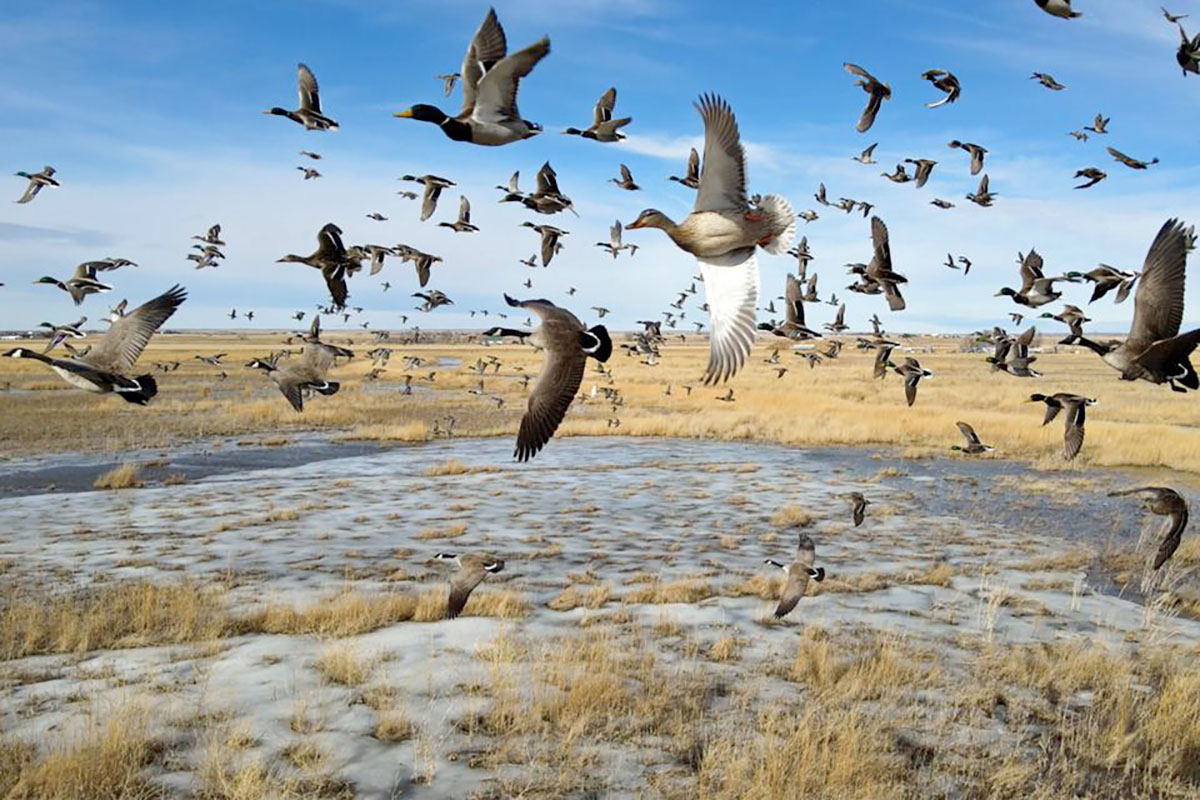When the Old Duck Hunter’s Association, Inc., died, the hearts of many men fell to the ground.
There was no one like Mister President. When the old-timers go there is no bringing them back, nor is there any hope of replacing them. They are gone, and there is a void, and for many, many years I knew the void would never be filled, for this paragon of the duck blinds and the trout streams had been the companion of my heart’s desire for almost 20 years.
I made the common mistake. I looked for another, exactly like hizzoner. How foolish it is, as foolish as it is for a man to try to find another beloved hunting dog, exactly like the one that’s gone.
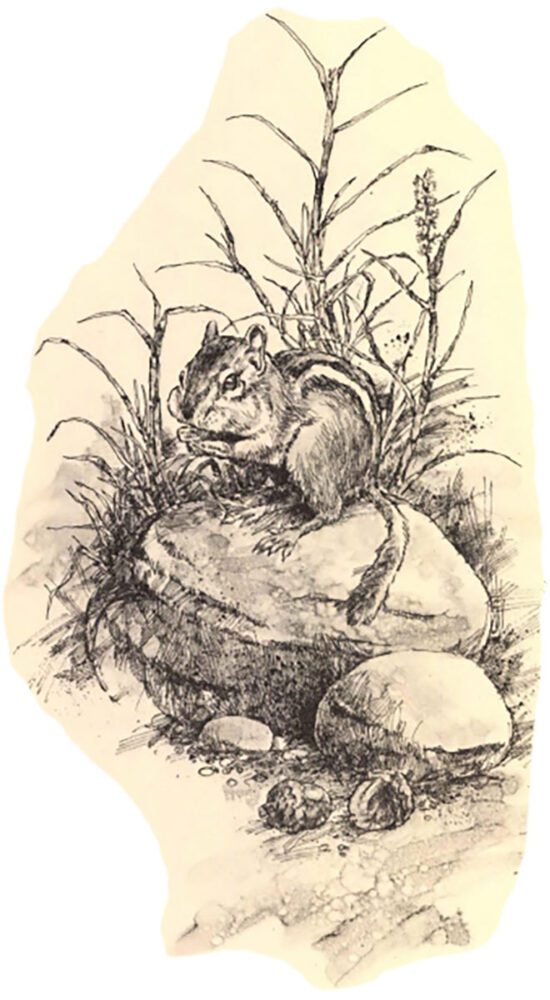 In the years after Mister President’s death I fished and hunted more than before, and often alone. There was a great deal of fishing and hunting, from Florida to Alaska, before a man came along who fit the role once occupied by Mister President. This is how it was:
In the years after Mister President’s death I fished and hunted more than before, and often alone. There was a great deal of fishing and hunting, from Florida to Alaska, before a man came along who fit the role once occupied by Mister President. This is how it was:
I was sitting in the ballroom of the Lorraine Hotel in Madison, Wisconsin, covering the proceedings of the unique Wisconsin conservation congress. I became aware that a man carrying one of the 71 labels for the 71 counties of the state was eyeing me.
He held aloft the cardboard label “Iowa” signifying that he was a Big Wheel in conservation from that western Wisconsin county. He looked like Huckleberry Finn, and he grinned eternally. One of the first thoughts I had about him was that he probably could not tum down the comers of his lips if he wanted to.
Each time I glanced at him his eye was upon me. This sort of thing is unnerving. Once he caught my eye and held it and grinned harder. I grinned back, foolishly. The beggar burst out laughing. I felt like a fool. He knew it and laughed at me.
Let me give you the picture more completely. In that rooms at more than 300 dedicated, articulate conservationists. They were framing, no less, the fish and game code of this sovereign state for an entire year. Not in silence, you may be sure.
Up at the front table on the platform, as chairman of the congress, sat Dr. Hugo Schneider of Wausau, with a gavel in one hand and — so help me! — a muzzle-loading squirrel rifle in the other. Each time Roberts Rules of Order seethed about to go out the window, Doc would abandon the gavel and reach for the rifle.
In this delightful pandemonium, in this convention of impassioned hunters and fishers and amidst the shrieks from the wounded and dying delegates, Wisconsin evolves its game and fish laws. And if you can think of a more democratic way, suggest it. We may try it.
At one point in the milling commotion and confusion, I saw my grinning friend slip to the floor and on his hands and knees start crawling toward me. By this manner of locomotion he managed to evade the baleful eye and subsequent vengeance of Dr. Schneider, and he crawled up to my chair and handed me a scribbled note. Then still on his hands and knees, he crawled away. The note read:
“I’ve been reading your drivel far years. See me after school if you want to get some good partridge hunting.”
Harry
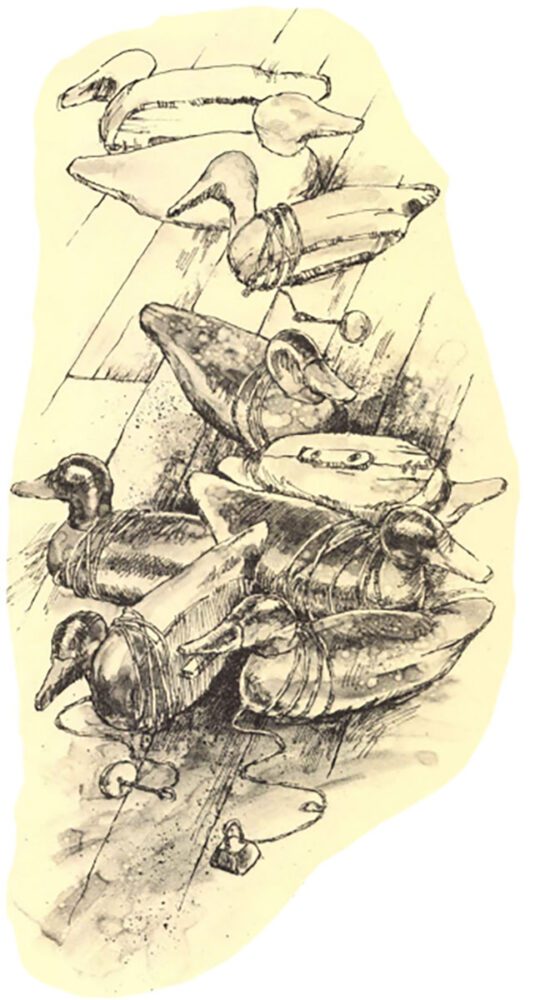 Since then, I suppose I’ve “seen him” a thousand times — on trout streams, on lakes, in partridge cover, in the deer woods, in the quail thickets, and yes, in the August cow pastures where the blackberries grow as long as your thumb, and in the good September days when you can fill a bushel basket with hickory nuts beneath one tree.
Since then, I suppose I’ve “seen him” a thousand times — on trout streams, on lakes, in partridge cover, in the deer woods, in the quail thickets, and yes, in the August cow pastures where the blackberries grow as long as your thumb, and in the good September days when you can fill a bushel basket with hickory nuts beneath one tree.
No outdoor event of its season escapes Harry. He is lean and 50-ish. He is a superb hot. He ties his own flies, one a black killer with a tiny spinner at the eye made from special light material he begs or steals from dentist friends. On a dare, once he shinned up a 12-foot pole and came back down headfirst. Once he made me a pair of buckskin pants. All in all, he was an unbelievable person.
How natural then, just this last October, that we should rendezvous, not in Iowa County – we save those partridge until December — but at the ancient headquarters of the Old Duck Hunter’s Association, two whoops and a hollar north of Hayward, Wisconsin.
I got there first. This is not hard for me to do when going to this place. Some things do not change, and this is one of those things. It’s exactly like it was before the atomic age. On that particular day, late October’s yellow shafts were slanting through the Norways on the old cedar logs of the place. A chipmunk which had learned to beg in summer came tentatively close, then scurried away, uncertain now.
All was in order, down to the new windowpane I had to put in where a partridge in the crazy time had flown through. The label was still pasted to the tiny square of glass. I must scratch it off some day, but there is always so much to do at places like this.
I went to the shed at the rear to check decoy cords and anchors. When you open this shed door one of the first things to catch your eye is a brown, checked-pattern Mackinaw, about 50 years old, I guess. It belonged to the President of the Old Duck Hunters. I like to keep it there. It belongs there.
Flying squirrels had filled one pocket of the Mackinaw with acorns. They always do that, but these avian rodents, so quick to unravel soft, new wool for nests, have never chewed at the threadbare carcass of Mister President’s heroic jacket. Perhaps this is because the wool, felted and tough, has lost its softness and flavor. I launched a boat, readied a smaller skiff and screwed the motor on the big boat. I fetched three bags of decoys down the hill and put them in a handy place. I put an ax-for blind building-in the boat with other gear, and when I got backup the hill to the cabin, Harry was there.
On the way-a 300-mile drive-he had hesitated, he said, long enough to slay two pheasant roosters.
“I see,” he said, “that you have been here an hour and have killed ‘ary a duck or partridge.” He explained that he had felt my auto radiator-“She’s cooled only about an hour.” This man operates like a house detective. I explained that in the remaining hour and a half of daylight I would prepare him a kingly supper.
“An hour and a half of daylight!” He flung two skinned pheasant at me, dashed to his car and returned, running, bearing fishing tackle.”
D’ja soak the boat?” he cried as he passed me. I doubt if he heard my answer for he was soon down the hill and nearing the beach when I replied. Within two minutes he was trolling.
The man never lived who could fill up each moment of a day like this one. Nor was there ever a one who could, once the day was done, fall asleep so fast. He goes, I am sure, into a world of dreams, there to continue the pursuits of fish and game, man’s lifeblood — well, his anyway.
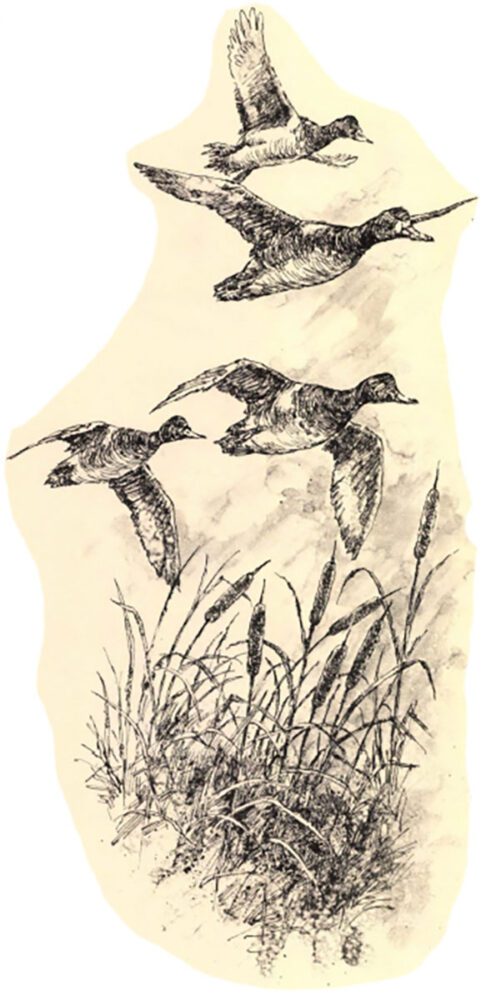 I lit the fireplace. No need for the big steel stove, or was there? Late-October weather in the North can be treacherous. I laid the big stove fire, to play safe. The provident Harry had made getting supper easy. You take two pheasant and cut them up. You save the giblets. You steam some wild rice for an hour….
I lit the fireplace. No need for the big steel stove, or was there? Late-October weather in the North can be treacherous. I laid the big stove fire, to play safe. The provident Harry had made getting supper easy. You take two pheasant and cut them up. You save the giblets. You steam some wild rice for an hour….
It was long after dark when Harry returned. He had a seven- or eight-pound northern and a walleye half as big — “If we’re gonna be here for four days, somebody around here has got to bring home the grub.”
I set the table fast for fear he would fall asleep. He stuffed himself with pheasant and wild rice and mentioned that he must not forget to tell his wife how badly I treated him. Then he collapsed on the davenport before the fire, and in one yawn and a short whistle he was gone. ‘I washed the dishes.
No, he was not a shirker. Before sleep afflicts him he will kill himself at any job which needs doing, especially if it pertains to hunting and fishing. To prove his willingness for the menial tasks, I recall a deer camp one night when one of the boys brought in a 300-pound bear—dragged him right through the door and dropped him at Harry’s feet.
Harry was wiping the dishes, clad only in a suit of new, red underwear. He had sworn to be the first man in that camp to bring in important game, and because now he obviously had not, he turned, dishcloth in hand, eyed the bear casually and remarked:
“Johnny, that’s a mighty-nice little woodchuck you got there.”
Even when I turned on the radio for a weather report he did not awaken. His snores, wondrously inventive, competed with the welcome report of changing and colder weather. Outside the wind was coming along a bit, and it was in the northwest. But mostly it was the warm wind hurrying back south ahead of something colder at its back.
Iowa County’s nonpareil was bedded down in the far room where his snores joined the issue with the rising wind which keened over the roof. A good fair contest, that.
When I arose, I had to light the big heater for the weather had made up its mind. No snow, but a thermometer at 26 degrees Fahrenheit and a buster of a wind. I hurried with breakfast because I thought we might have to build a blind on Posey’s point. That point, the right one on this day, had not been hunted in the season. When I mentioned the reason for haste he explained:
“Man, I built that blind yesterday. You think I fooled away three hours just catching a couple of fish?”
It is not possible to dislike a man like that. Furthermore, I knew this blind would be no wild dove’s nest, but a thing of perfection, perfectly blended with the shoreline.
A lot of people in this country think the old Duck Hunters are crazy when they hunt this lake. We carry so many decoys that we have to tow them behind in a skiff. Fifty is our minimum, half of them oversize balsas, and a scattering of some beat-up antiques more than 120 years old, just for luck.
Settling himself for some duck-blind gossip, Harry began, “I was down on the Mississippi at Ferryville last week. Mallard all over the—”
“Mark!”
A hundred bluebills, maybe twice that, who knows, came straight in without once swinging, and sat. We never touched a feather as they rose. I have done it before, and I’ll do it again, and may God have mercy on my soul.
“This,” said Harry, “will become one of the greatest lies in history when I tell my grandchildren about it. I am reminded of Mark Twain. When Albert Bigelow Paine was writing his biography and taking copious notes, he once remarked to Twain that his experiences and adventures were wonderful copy.”
‘Yes, yes,'” replied Mr. Clemens. “‘And the most remarkable thing about it is that half of them are true.
He then set his jaw and announced he would kill the next three straight with as many shots. This he did, for I did not fire. While I was retrieving them in the decoy skiff, another bundle of bluebills tried to join those giant decoys and were frightened off by me. Walking to the blind from the boat, I saw Harry kill a canvasback.
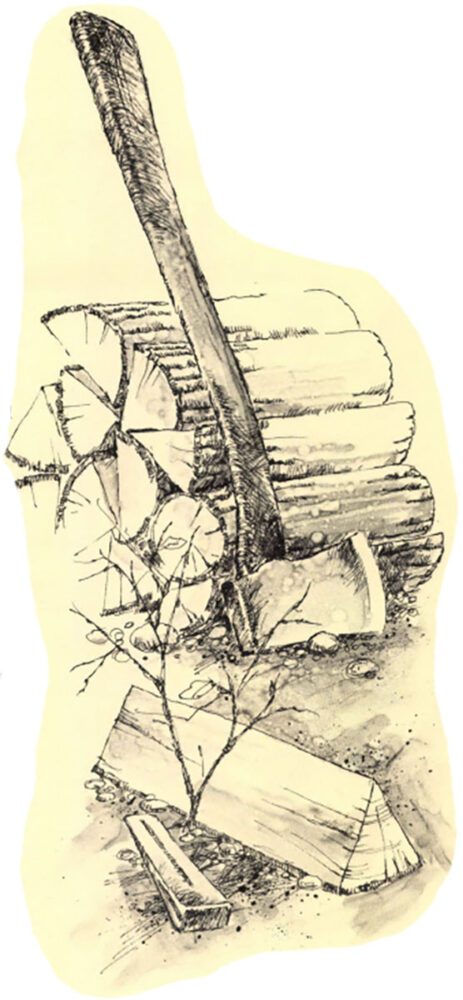 He was through for the day and not a half hour had passed. Many Badgers will remember that late October day of1955. Ducks flew like crazy from the Kakagon Sloughs of Lake Superior to sprawling Horicon Marsh, 300 miles away. Only one other day of that season beat it-Wednesday, November 2. Harry cased his gun and watched. I cannot shoot like Harry, but getting four ducks on such a day was child’s play. Many times we had more divers over our decoys than we had decoys. It was pick-and-choose duck hunting. I settled for four bullneck canvasbacks.
He was through for the day and not a half hour had passed. Many Badgers will remember that late October day of1955. Ducks flew like crazy from the Kakagon Sloughs of Lake Superior to sprawling Horicon Marsh, 300 miles away. Only one other day of that season beat it-Wednesday, November 2. Harry cased his gun and watched. I cannot shoot like Harry, but getting four ducks on such a day was child’s play. Many times we had more divers over our decoys than we had decoys. It was pick-and-choose duck hunting. I settled for four bullneck canvasbacks.
Back at the cabin, we nailed their bills to the shed wall, and over a cup of coffee Harry said the divers we’d seen reminded him of the “kin to can’t day.” Then, he explained, the law let a man shoot the whole day through from as soon “as he kin see until the time that he can’t see.” I knew a place, Oscar Ruprecht’s sugar bush, and we drove the eight miles to it.
This chunk of maple is on an island of heavier soil in an ocean of glacial sand, grown to pines. If its owner had the equipment he could tap 5000 trees. Many know it and hunt it. We separated, for we are both snap shooters, or think we are.
The plan was to meet on a high, rocky bluff where the River Ounce passes by below, on its way to the Totagatic. Here was no dish like that easy duck-blind venture. These were mature, hunted ruffed grouse, all the more nervous because the wind was high. On one of the tote trails where Oscar’s tractor hauls the sap tank I missed my first bird, then missed two more.
A half mile to my right, two calculated shots sounded, well-spaced. Perhaps a double. Ah, well … My fourth bird was as good as dead when it got out of the red clover in midtrail and flew straight down the road. I missed him, too.
Three times more, and later a couple more times Harry’s gun sounded. Then two birds flung themselves out of the yellow bracken beside the two-rut road, and I got one. When I was walking over to pick it up, a third pumped up, and I got it.
It was noon when I got to the high bluff. Deer hunters with scopes on their rifles love this place. From it they overlook almost a half mile of good deer country in three directions. My sandwich tasted good. I lit a little friendship fire and thought about other days on the river below me. It’s a pretty good trout stream for anyone who will walk in two miles before starting to fish.
Harry came along. He’d been far up the valley of the Ounce, bucking fierce cover-no sugar-bush tote trails in there, only deer trails. But he had five grouse. We hunted back to the car, and in his presence I was lucky enough to kill my third bird.
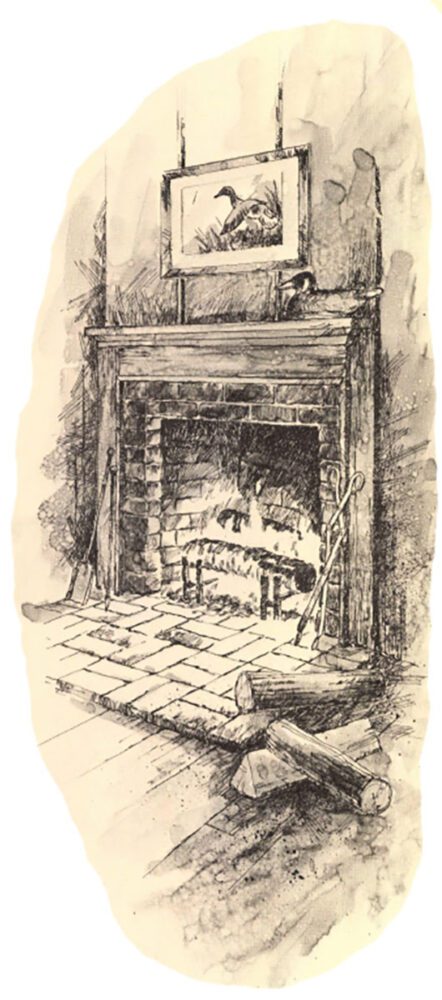 It was around 2 p. m. when we pulled into the cabin. My Huckleberry Finn, who I have seen, on occasion, whittle away at a pine stick for 20 minutes without doing anything but meditate, was a ball of fire on this day. He tied into the ducks and partridge. When he had finished cleaning them his insatiable eye fell upon the woodpile.
It was around 2 p. m. when we pulled into the cabin. My Huckleberry Finn, who I have seen, on occasion, whittle away at a pine stick for 20 minutes without doing anything but meditate, was a ball of fire on this day. He tied into the ducks and partridge. When he had finished cleaning them his insatiable eye fell upon the woodpile.
You can spot those real country-raised boys every time when they grab an ax. They know what to do with it. No false moves. No glancing blows. In no time he had half a cord of fine stuff split and piled for the kitchen range, and he went on from that to the sheer labor of splitting big maple logs with a wedge for the fireplace.
He spotted my canoe and considered painting it, but decided it was too cold, and anyway, it had begun to snow a little. Then he speculated about the weather, and when I said I wish I had a weathervane on the ridgepole, he went into action.
He whittled out an arrow from an old shingle, loosely nailed it to a stick, climbed to the roof and nailed it there firmly. I suppose that if I had mentioned building an addition to the back porch he’d have started right in. He came down from the roof covered with snow and said he wished he hadn’t killed those four ducks in the morning, so he could go again.
“But, let’s go anyway,” he suggested. “No guns. Put out the decoys and just watch ’em.”
Out there on the point the divers were riding that wind out of Canada. Scores of them rode into and above the decoys. Posey, the owner of the point, came along for a visit and decided we were both crazy when he saw what we were doing. Nevertheless, we had him ducking down as excited as we were when a new band of bluebills burst out of the snow. Only in the big duck years can a hunter enjoy such madness.
Our shore duty at dark that nigh involved careful preparations against the storm. We pulled up the boat and skiff higher than usual and covered everything with a weighted tarp.
Walking up the hill, I considered how nice it was to have one of the faithful, like Harry, on the premises. He should have been bone tired. Certainly I was. But before I relit the big heater, he took down its 15 feet of stovepipe, shook out the soot and wired it back to the ceiling. He carried in enough wood for the remaining three days, stamping off snow and whistling and remembering such tales as one hears in all properly managed hunting camps.
He spied a seam rip in my buckskin pants and ordered me to take them off. While he mended them he complained bitterly about such neglect on my part— “There’s nothing wrong with the workmanship on these pants.”
He had made them himself, two months before, from two big chrome-tanned doeskins. He just walked into my house one night with a gunnysack containing the skins, a piece of chalk and some old shears his wife used for trimming plants. He cut the pants out, fitted them to me and took them to the shoemaker’s shop where he sewed them up and affixed buttons. I never in my life wore pants that fit so well.
This man should have been born in the same time as a Kit Carson or a Jim Bridger. Tum him loose anywhere in his native heath, which is Wisconsin, and, given matches, an ax, a fishhook and some string, he’ll never go hungry or cold.
He is a true countryman, a species almost extinct. Each day of the year finds him outdoors for at least a little while. In trout season he hits the nearby streams for an hour or two around sunup. His garden is huge and productive. In the raspberry season you may not go near his home without being forced, at gun point if need be, to eat a quart of raspberries with cream.
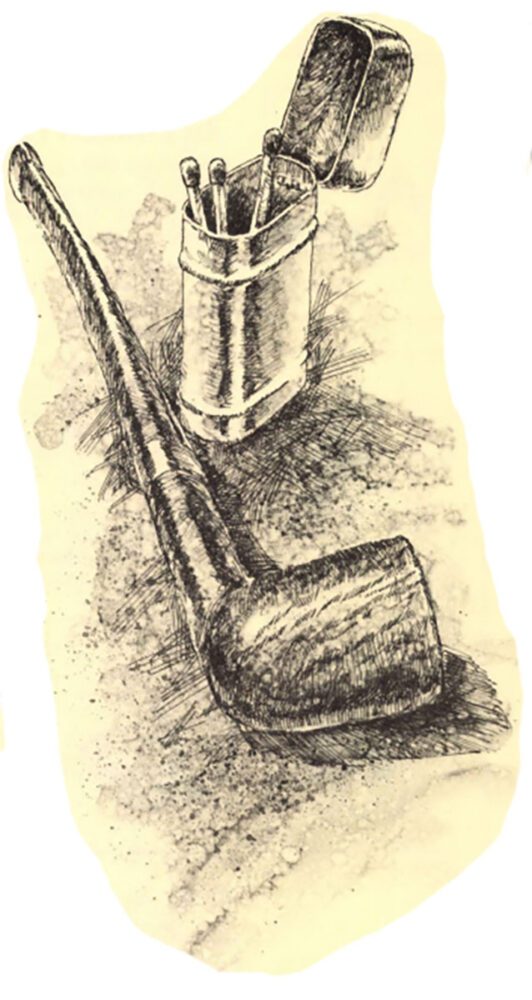 He represents something almost gone from our midst. He knows the value of working with his own hands, of being eternally busy, except when sleeping. His last act that snowy evening was to go to his car and return with a bushel of hickory nuts. He set up a nut-cracking factory on a table, using a little round steel anvil he had brought for busting ’em. He had over a quart of hickory nut meats in jars when I put the grub on the table.
He represents something almost gone from our midst. He knows the value of working with his own hands, of being eternally busy, except when sleeping. His last act that snowy evening was to go to his car and return with a bushel of hickory nuts. He set up a nut-cracking factory on a table, using a little round steel anvil he had brought for busting ’em. He had over a quart of hickory nut meats in jars when I put the grub on the table.
He almost fell asleep at the table. Then he yawned and whistled and looked out the door and said he was glad it was snowing hard — “Don’t shoot at anything but cans in the morning.” He flopped on the davenport and was gone to that far-off land where no trout of less than five pounds comes to a surface fly and the duck season runs all year.
I tidied up and washed the dishes. I smelled the weather and smoked a pipe. The fireplace light danced on the big yellow cedar beams. The snow hissed against the window. The President of the Old Duck Hunter’s Association should have been there.
Maybe he was. At any rate, I went out to the shed and took the old brown Mackinaw off its nail and brought it in and laid it over Harry’s shoulders. It looked just fine there.
Editor’s Note: This article, written by Gordon McQuarrie, originally appeared in Sports Afield Magazine October 1956 issue. Was then reprinted in Stories of the Old Duck Hunter & Other Drivel published by Willow Creek Press. Then published in the 1982 Volume II, Issue 1 of Sporting Classics.
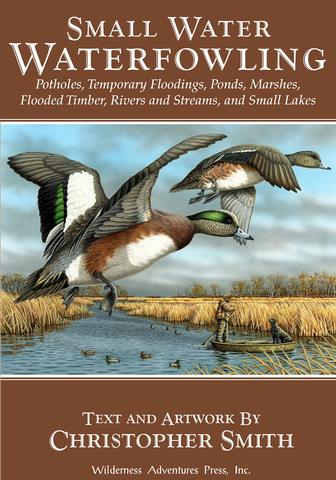 When it comes to actually shooting ducks and geese over water, the action is on the small places – the inland lakes, the ponds and potholes, the floodings and creeks and backwaters. Day in and day out, that’s where the ducks are, and that’s where Chris Smith takes you. Buy Now
When it comes to actually shooting ducks and geese over water, the action is on the small places – the inland lakes, the ponds and potholes, the floodings and creeks and backwaters. Day in and day out, that’s where the ducks are, and that’s where Chris Smith takes you. Buy Now

